Rich Fructooligosaccharide Sources and Why You Should Include Them in Your Diet
 Jerusalem artichoke
Jerusalem artichoke
For a long time I was unaware of the need to include at least some foods that contain Fructooligosaccharides (FOS) in my diet. Our western type of diet is so devastating when it comes to having optimal gut flora. That’s why these foods can be of great help to restore the functioning of the digestive system and improve our general health.
At one point, I came across Jerusalem artichoke, which is basically an inulin containing root, and pretty quickly was amazed at its impact on my health. Now, I use it every time when I can find it on my local market. I use it to replace potatoes, which thankfully I no longer use.
I also increased the intake of other plant sources of Fructooligosaccharides that I had already used every now and then, but I didn’t know how beneficial they were. Those are, for example, leeks, asparagus, and onions.
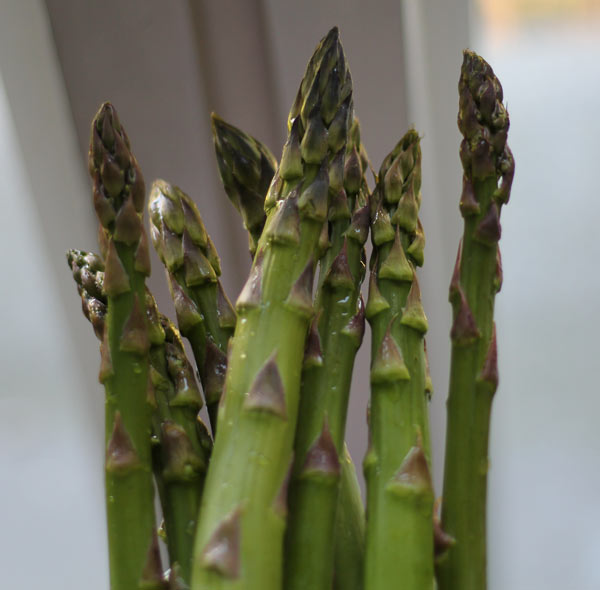
Asparagus tops
In this article I will try to explain what’s the point with these FOS foods and why you too should be using them on a daily basis.
Table of Contents
The Problem of Digestible Carbohydrates
The standard western diet is based on carbohydrates. The main problem is that consuming too much dietary carbohydrates as a primary source of energy for the various functions in your body is not the best choice. Especially if you rely on simple carbohydrates, like sugar, or on high-glycemic foods, like bread or pasta. It has become increasingly clear that those types of fuel sources are the main contributing cause of premature aging and a huge range of diseases.
However, as I said, there is a great alternative that comes in the form of partially-digestible carbohydrates, including fructooligosaccharides, and to a lower degree, galactooligosaccharides. These carbs are also referred to as resistant starches.
Not only are these foods tasty and delicious, they offer ample amounts of dietary fiber, increased production of short-chain fats in the colon, and friendly environment for increasing the number of beneficial gut bacteria.
I cannot overstate how important taking enough dietary fiber is. Otherwise, and especially if you consume a lot of grains and sugar, you are promoting the growth of bad bacteria that, in turn, produce endotoxins and damage your health. It is also known that sugar promotes the growth of fungi and pathogenic yeast.
What are Fructooligosaccharides?
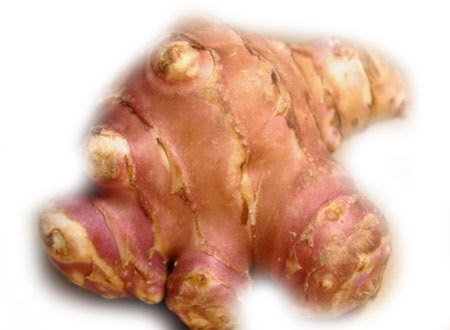
Jerusalem artichoke
Fructooligosaccharides (FOS) are a non-digestible (or partially-digestible) type of carbs found in some vegetables. Because they are slightly digested or not digested at all in the stomach, they end up in the colon where they serve as food for the good bacteria. They consist of fructose molecules joined together in short chains. The term oligo comes from the Greek language and means “containing a small number of units”. The term saccharides means “sugars”, so the complete expression could be translated like this: “some number of fructose molecules joined together to form a more complex sugar molecule“.
Another similar class of sugars are the Galactooligosaccharides (GOS). They consist of galactose molecules joined together again in short chains. Like Fructose, Galactose is a type of simple sugar (monosaccharide). The GOS type of nutrients are usually found in soybeans.
Some Formulas
Here are some conceptual formulas of the various sugars we are talking about. Just to make things clearer:
- Fructose+Glucose = Table sugar (disaccharide).
- Galactose+Glucose = Lactose, the milk sugar (disaccharide).
- Fructose+ Fructose+ Fructose+…. = Fructooligosaccharides (inulin).
- Galactose+Galactose+Galactose+… = Galactooligosaccharides.
Both table sugar and lactose are the bad guys because our body can digest them. In contrast, FOSs are the good guys because our body can only partially digest them (even though they contain fructose as one of the worse sugars there are). In the following we will see exactly why this is good.
Plant Sources of FOS and Their Benefits
Among the FOS carbohydrates, inulin is one of the most researched and best known representative. Inulin is contained in the roots of a number of plants, including chicory root, elecampane root, Jerusalem artichoke, leeks, sweet potato, asparagus, onions, garlic, dandelion root, and burdock.
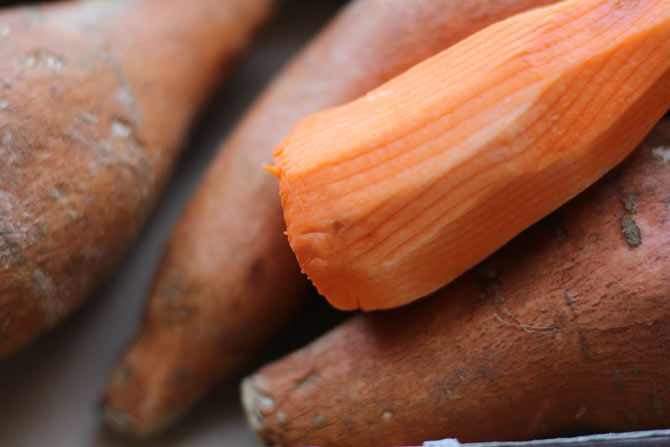
Sweet potato peeled, raw
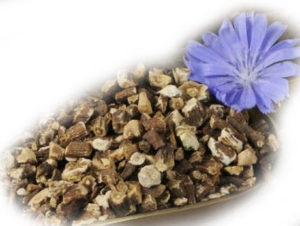
Chicory root
As I said, the fact that we can digest these compounds only partly in our digestive system is the main reason why they are so beneficial for our health. Here is what is happening:
- The portion that is undigested gets into the colon and feeds the good (or friendly) bacteria there. Those are the Lactobacillus and Bifidobacterium species. As a result, the number of beneficial bacteria increases.
- At the same time, consuming FOS reduces the number of harmful bacteria in the column.
- When the friendly bacteria metabolize FOS or GOS foods, the byproduct of their metabolism are the butyrates – short chain fatty acids very beneficial for our health.
- FOS or GOS help increase the absorption of magnesium and calcium.
- FOS or GOS help in the process of elimination of toxins from the body.
- FOS or GOS help reduce the colon pH.
- In addition inulin and other FOS compounds can lower the levels of blood lipids, such as triglycerides and cholesterol in the blood. This is important, for example, if you have type-2 diabetes, or if your cholesterol or triglyceride levels are elevated.
Possible Side-effects
It is important to know that the FOS are indiscriminate and that they may also fuel the growth of the bad bacteria. One such example is the klebsieilla, a bacteria that may cause leaky gut and spondylitis. Some people have difficulties digesting inulin. The possible side-effects are bloating, diarrhea, and gas. In general, most people are able to digest FOS without any problem.
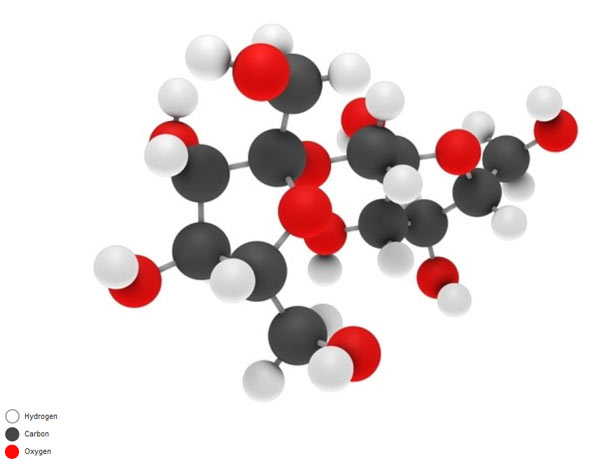
Inulin molecule
The Bottom Line
I hope I’ve been able to convince you how important these foods are. If you have autoimmune problems, diabetes type-2, and similar problems, or you just want to improve your health naturally, a good idea is to include inulin-containing foods or other types of FOS foods in your daily diet. For example onions, leeks, and Jerusalem artichoke can be consumed daily. I never regretted doing that. Questionable solution is supplementation with inulin or FOS tablets or capsules.
Be aware that inulin is not a universal solution to all problems. It is just a piece of the puzzle of your perfect gut health. Include unprocessed whole foods. Drastically reduce the damaging sugars and grains. Avoid GMO foods, pasteurized and processed foods. Include a lot of cultured and fermented foods prepared in a traditional way.

This is a very interesting post! I have not read anything on FOS in the past. I am going to have to research this more. I know the human body needs sugar to function properly it is just that most people get their sugars the unhealthy way! Great post!
Hi Britanica and welcome to the site. Well, sugar is not as essential a fuel source as many people use to think. We just believe we cannot function without it, which is not true. Many nutrition specialists also seem to think so. We have another much more stable and sustainable fuel source – short fatty acids, ketones. In fact, sugar is inferior as fuel to ketones. But you are right, every now and then, we need to take in some sugars, and our choice is FOS over all the other types of carbs.
I am trying the Keto diet. Can I have fructooligosaccharides ? They are in a powder that I’m putting in water. I’m not sure if they’re considered a sugar or carb which I need to stay away from.